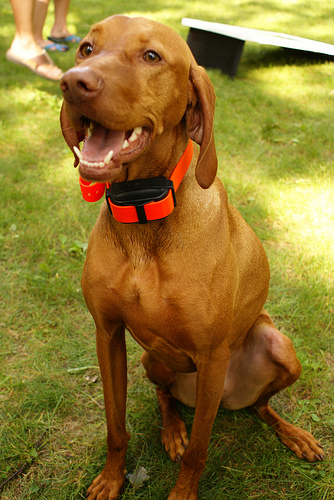E-collars have proponents and opponents in the dog training field. Proponents believe that they can effectively rid dogs of troublesome behaviors and even keep them safe. Opponents say that inexperienced owners often don’t understand the danger of these collars and injure pets. Whether you agree or disagree, e-collars are dog training tools used by trainers and owners.
Electronic collars come in different forms. There are collars that are used with invisible fence systems to keep dogs in a particular area. There are also collars owners buy to stop their dogs from excessive barking. These collars shock the pet automatically when they bark. The owner can control other e-collars when the puppy needs correction.
These collars can be adjusted for different settings. The lowest setting feels like a mild zap. If you have ever experienced a shock from static electricity, then you will understand what the dog feels on the low setting. Higher settings increase the intensity of the jolt the canine receives.
These higher settings are what concerns opponents of e-collars. Owners don’t always realize just how high the voltage can be. For invisible fences, that setting can be high enough to cause a pet serious harm. Even regular electronic collars can burn the skin of pets if used repeatedly. Veterinarians and groomers who are against these collars have seen dogs with severe burns to the point where fur will never grow back in that area. They suggest that no owner should use a shock collar on a dog before they have used it on themselves first.
 Some trainers who use these collars say that owners should research and understand the proper use of these dog training tools before they use them. Keeping them on the lowest setting and only using them as a method of correction will not harm the pet. The idea behind these collars is that the dog will not like the shock and will avoid the behavior that will result in its use.
Some trainers who use these collars say that owners should research and understand the proper use of these dog training tools before they use them. Keeping them on the lowest setting and only using them as a method of correction will not harm the pet. The idea behind these collars is that the dog will not like the shock and will avoid the behavior that will result in its use.
The negative stimuli of these collars can be mitigated in other ways. Some of these devices are designed to shock the puppy the first few times on a low setting. Then they emit a warning high-pitched beep before the shock. For example, with an invisible fence, if the dog goes near a certain point, he will hear the high pitch noise. If he stops there, then no further action would be required. If he goes beyond that point, he will receive a shock. After a few times, the dog will learn to turn back before the shock.
If you want to use e-collars, you don’t have to purchase one that shocks your pet. Some use citronella, and others use water. Dogs don’t like citronella but it doesn’t hurt them. When the owner activates the device, the collar sprays the citronella and the dog reacts to the smell.
The water collar sprays water in the dog’s face when she barks or the owner activates it. Although dogs like to swim, most don’t like being sprayed by it and will stop the negative behavior to keep from being sprayed again. This will help owners who have tried other methods to stop their dogs from excessive barking or from running out of their yard.
Some owners may feel that they don’t have any other choice when it comes to e-collars. They may live in an area that fines people if their dogs bark too much. Some people live by a busy road, and they are afraid that their dog will run out in the street and get hurt by a car. These owners may feel that the temporary discomfort caused by the e-collar is less than the pain their dog will experience if they are hit or have to have their vocal chords removed.
Owners need to make up their own minds when it comes to electronic collars as dog training tools to correct or train their dogs. They should read about them and talk to dog experts they trust, such as their veterinarian. If you decide to use an e-collar, make sure that you understand the settings and use it judiciously to prevent harming your pet. On the other hand, you can consult a dog trainer about other possible training methods to alter bad behavior.
There are trainers who believe that with other training tools that are available, such as clicker devices and positive reinforcement tools, e-collars aren’t even necessary. For other dog training tools, see dog training treats, dog training devices, dog training aids, dog training supplies and clicker dog training.
